‘The Gentlemen’ Star Theo James Reignites His Passion For Comedy On Guy Ritchie’s Sendup Of British Aristocracy
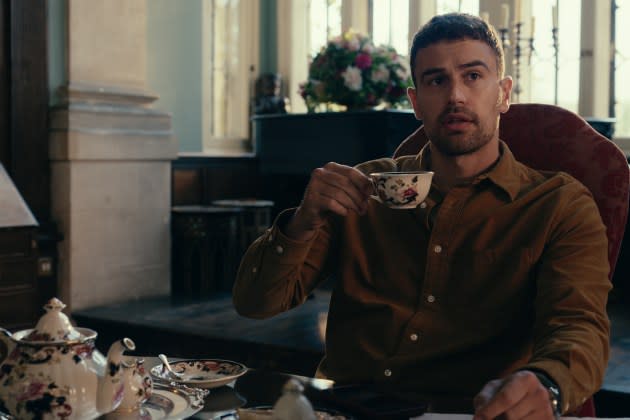
After a stint as an obnoxious, loud American in The White Lotus, Theo James wanted to challenge himself by playing someone totally different. Enter Eddie Horniman, the reserved, British Duke thrown into an aristocratic weed-growing empire in Guy Ritchie’s Netflix series The Gentlemen. Not only was this an opportunity for a Godfather-style ascension story and a chance to work with the Lock, Stock director, but James was also excited to take some pot shots at the gentry that owns so much British land — much to the bemusement of the real-life Duke of Beaufort, whose estate was the location for the shoot.
DEADLINE: What got you interested in The Gentlemen role?
More from Deadline
THEO JAMES: I love ascension stories. I’ve always found them really gratifying as an audience member, someone who starts off at one place and evolves into another. I also like the parallels. We talked with Guy and the writers, not that we’d ever emulate The Godfather because it’s obviously one of the greatest films of all time, but that story of the young moral son who comes home, becomes the head of this complex, f*cked up family and then has to navigate the world around him. And in doing so, becomes corrupted by violence and power.
That is a great conceit because in a way, the simpler, strongest conceits are the ones that we often identify with great stories in film and TV. And then beyond that was sending up British class and aristocracy. It’s such a huge part of our culture and it defines British identity that I thought it would be both comedic, but also in the lightest possible way, interesting to delve into this idea of an aristocratic family smashed into the world of a contemporary kind of Peaky Blinders. I thought that was a fun mashup. And then also I think this idea of landed gentry. We romanticize it, but as the script says, there’s something deeply corrupt about that and there always has been. So, commenting on that is rather delicious.
DEADLINE: There’s something very interesting about your character, seeing someone who is so simultaneously out of their depth but in their element at the same time.
JAMES: Yeah, he’s a tactician and he’s smart and he’s probably born to do that, but the idea Guy and I were very adamant about is he can never be winning at all times. So, when he wins, it’s almost accidentally. We built that into some of the violence as well. In the second episode, when he’s kind of confronted and has to claw his way out of getting murdered himself, he’s not a f*cking assassin. He’s actually just trying to survive. And in the gamut of the fight, he manages to win, but he’s always about to lose. And then he kind of pulls it together in the last minute. That was always kind of the idea about it, and I love that.
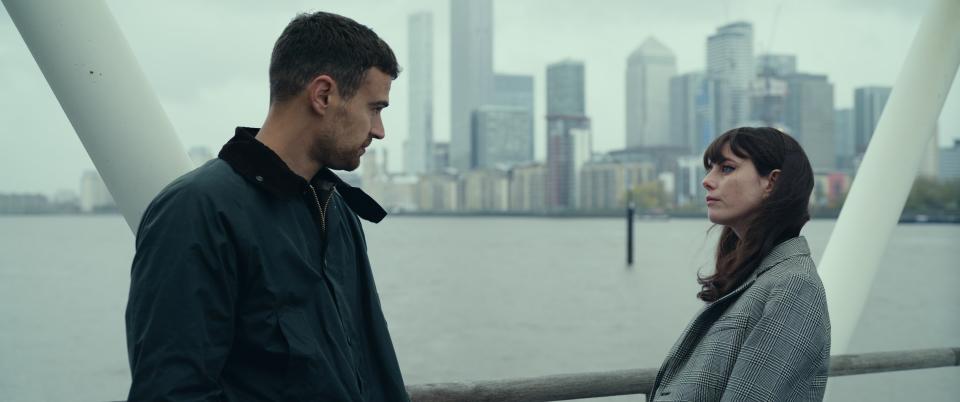
DEADLINE: Tell me a bit about working with Guy Ritchie on the series. I know he directed the first two episodes, but he was with the series for the whole season, right?
JAMES: Yeah, he was very involved. It felt like we just were filming one long film for the first two episodes. He’s relatively collaborative, but then he also knows tonally exactly what he wants. And when he finished his episodes, he said to me, “Look, as long as you have people who are in the room and willing to collaborate, you’re golden. Just make sure you don’t go too hard on the comedy because it becomes farce. Don’t go too hard on the drama because it becomes melodrama.”
It’s a very specific Ritchie tone, and I didn’t realize how specific it was until you’re doing it because it’s very true. You make it too funny, and it becomes silly. We found that, and we’d have to really dial that back and forth, both in performance, say with me and Freddy [Daniel Ings], but also in the edit afterwards with all the characters. And then you lean too heavy on the drama, because it’s a heightened world, and it suddenly becomes unreal in a way. Threading the needle was always quite difficult tonally because it’s a tone that is very specifically Guy and he’s the only one who does it.
DEADLINE: You mentioned the British aristocracy and, as an American with really no concept of that aristocracy, portrayals of that world always seemed kind of strange to me. We don’t usually see that as a comedic factor.
JAMES: Well, I think we’re used to the romance of British aristocracy with period drama and blah, blah, blah… But the show is interested in the fallacy of it. What I was fascinated by was the fact that I’m British, but I didn’t grow up anywhere near aristocratic circles. I’ve never met anyone in those environments. It’s kind of alien to me only other than in film or literature. So, it was fascinating to film in the estate where we shot the series, because it is a real estate. It is the Duke of Beaufort’s estate. He is a real Duke and he’s kind of eccentric and would be looking out of his window as we were murdering people and running around in chicken suits, with disdain.
Then you Google him and he’s kind of a mad character himself. I think he’s got a biography about his debauched, f*cked up life in the ’80s when he was partying like an animal. So, these characters exist in real life. It’s almost drawing inspiration from the insanity of them because, like in the show, they’ve inherited land, they’ve inherited an estate, as they have done for many centuries. The Duke of Beaufort owns a large swathe of Wales still, but they don’t have heavy income. They don’t have cash. So, the conceit is a very true one in that way, and that’s why we are filming on the Beaufort estate, it’s because they need bloody money.
And then beyond that, again, what was interesting is the ritual of those upper echelons of British society. Even though they’re now a little bit a relic of what they once were, they’re kind of a ghost of the past, there’s still so much ritual involved in that, how they talk, how they sit, how they eat dinner, how they interact with each other. So, using that comedically and not shying away from that was something that Guy and the rest of us were all very keen to do. It’s easy to judge aristocracy and go, “Oh, they’re just a bunch of f*cking poshos,” or whatever. But I think judging them as a character is not the right thing to do. You need to be seated within that world very much so, because there’s a lot of comedic value to be gained from that.
DEADLINE: You probably hear Netflix too and you automatically think it’s another Bridgerton spin-off.
JAMES: Exactly. That’s what all the country houses are waiting for, the check for Bridgerton 3.
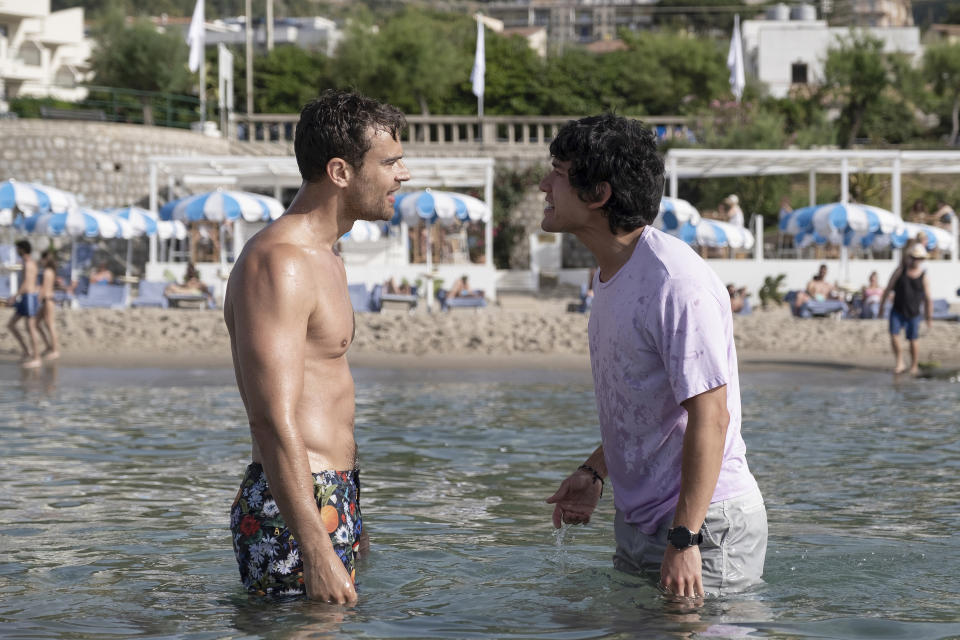
DEADLINE: The last thing that we saw you in was The White Lotus, as a very different character. What was it like going from working as a loud, obnoxious American to a posh, aristocratic British Duke?
JAMES: That’s what appealed to me about it really, because Cameron in The White Lotus represented Americana to me. He’s kind of vivacious, hyper confident, loud and wealthy, and Eddie is completely the opposite of that. Not only his Britishness is very British, he’s very buttoned up. It’s very economy of movement with him physically, he’s very different, but also as a personality, he’s kind of the opposite, which I loved.
Cameron would speak without forming an opinion. He’s just like, “Yeah, f*cking this happened and I tell you this f*cking thing because this is definitely the way it happened.” Even though he doesn’t necessarily know or understand some of the views he’s expounding, whereas Eddie is the antithesis of that. He listens, he takes in, then he calculates, then he speaks. So, doing the opposite was really fun, and again, the physicality of it couldn’t have been more different from Cameron. And after The Gentlemen, I did something completely different again. I’m trying, in my old age — older age, shall I say — to challenge myself more perhaps than I have done in the past.
DEADLINE: What did you do right after wrapping The Gentlemen?
JAMES: I did an episodic thing on Pornhub… No, I’m joking. I did a film, which I’ve finished not that long ago. It was a Stephen King short, genre, about two brothers. It’s called The Monkey, and I get to play two characters. They’re twins. One brother who’s psychotic and the other brother who’s damaged and extremely shy. So that felt like a completely different direction in a fun way.
DEADLINE: …So not another comedy?
JAMES: [Laughs] Actually, there is comedy to it. It’s kind of like Gremlins meets Hereditary, so there’s some humor in it.
DEADLINE: Other than that, the last two things that you’ve done have been comedies. Is that something that you want to do more of?
JAMES: I love comedy and I would like to do more, 100%. I started there in a way, when I was at university as an undergrad, we would take comedy that we would write and take it up to Edinburgh Fringe Festival every summer, and we would get audiences in. We would hustle on the street, we would pack the house. Then the next day we would talk about what jokes worked and what didn’t work, what landed, what wasn’t working, which characters felt fine and needed more evolution, what characters were really just kind of dead weight. And then we would adapt it and do the show again.
Then, in my early professional career, when I started actually doing it to pay my bills and pay off my mounting student debt, I found myself in a place playing… Not doing comedy. So, I’ve been trying to do more of it ever since, really. Coming back to it is definitely something that I want to continue doing because I love it and I find it fascinating not only as a performer myself, but enjoying other people’s performances within the work, whether that’s in The White Lotus and the characters that I’m acting against, or whether it’s in The Gentlemen with Kaya [Scodelario] and Dan and Vinnie [Jones] and everyone else. I think it’s so gratifying and I’d love to do more and more of it.
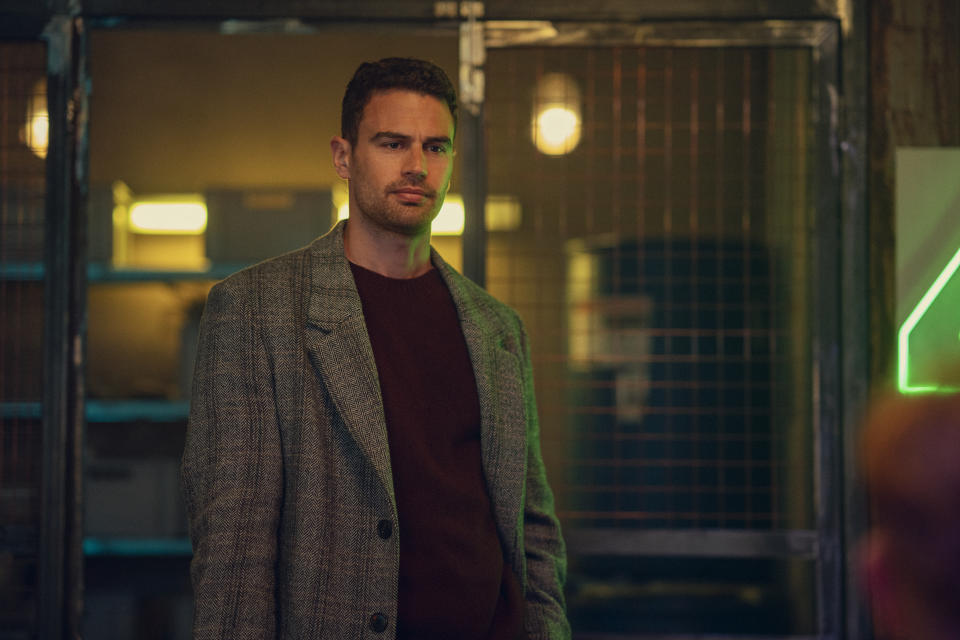
DEADLINE: As you go further into your career in comedy, what lessons are you taking from Guy Ritchie’s unique approach in The Gentlemen?
JAMES: I think a couple of things. One is it’s important to maintain stakes, and I found that with Guy, but also with the process of doing the whole Gentlemen show. With comedy, you need to retain stakes with all characters and all situations to make sure that the air doesn’t leave the balloon, especially with The Gentlemen, because if it becomes too silly, the audience ends up realizing that nothing really matters. By maintaining stakes, then you can have fast and high comedy, but then grounded in at least there are stakes for the characters and evolution for them. That means that the audience is going to still be locked into the story because comedy on its own, especially over episodes in a non-episodic TV sense, needs to have evolution.
The other thing which Guy’s great at, which I love about certain British humor as well, is he likes to take you on a journey, but then always undercut the self-seriousness of a scene. And I think that’s a very self-deprecating British thing to do, but it’s very valuable in comedy. You could always undercut the value. If you have to say something emphatically, you undercut the seriousness of the character in some way and that has great comedic value. That’s one thing Guy knows with style, and I hope with the show generally, is it can have stakes and darkness, but also it never takes itself too seriously. That can be key in comedy. You’ve got to be with the audience as opposed to apart from them or above them in any way.
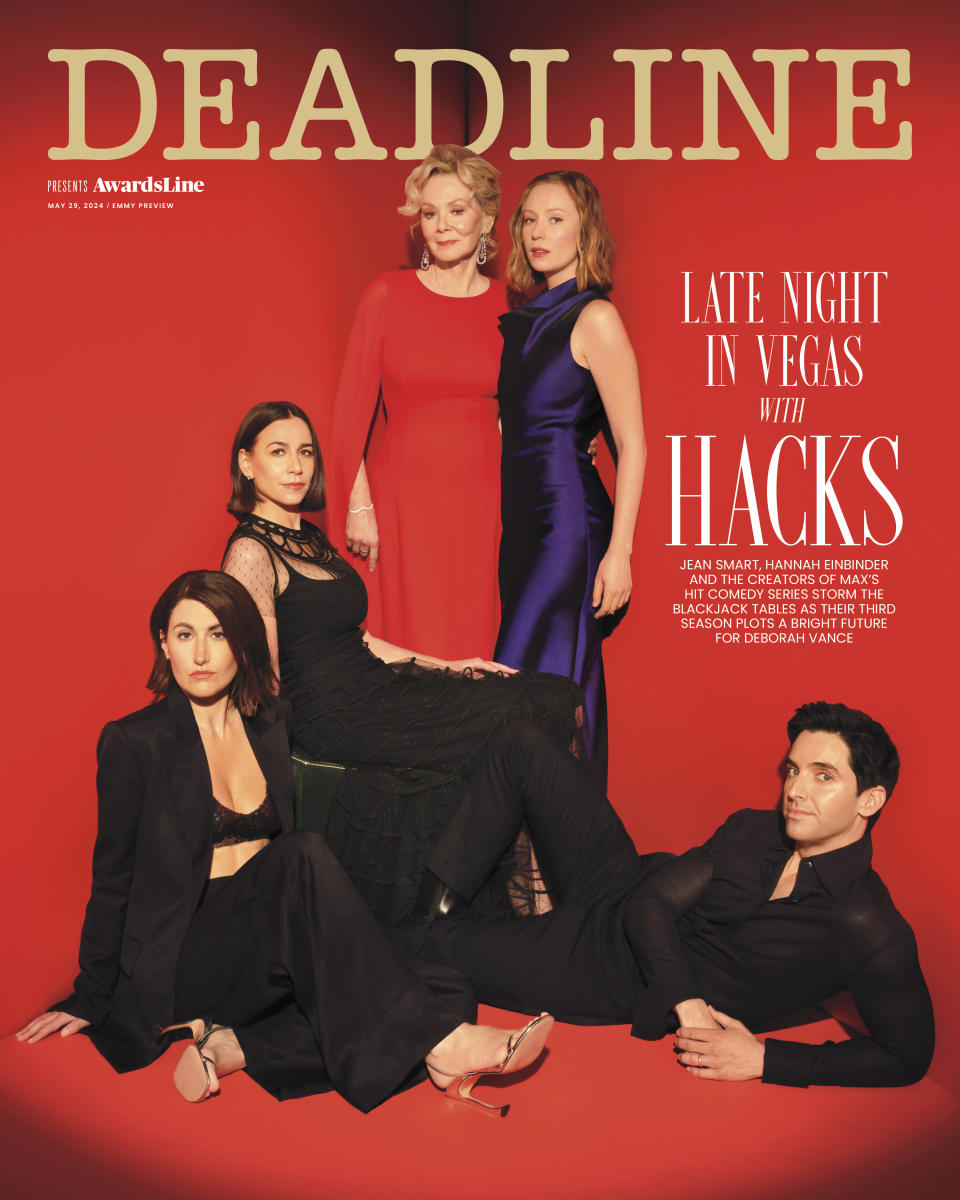
DEADLINE: If a second season of The Gentlemen happens, where would you want your character to go?
JAMES: Season 2 was never discussed when we shot it, but I think if you enter this world again, the important thing is it has to be different from Season 1. Season 1 is where we introduce the characters to the world, then there’s a backbone of story and there’s hijinks within that. If you continue in the same realm with the hijinks thing, I think you worry that you detract from some of the first season and it doesn’t build, and some of the storylines become a bit meaningless. So, I think if you do it again, it needs potentially to move out of Halstead Manor, it potentially would move out of Britain as well for some of it.
For me, again, you never emulate it because it’s one of the best films of all time, but the idea of The Godfather, that his soul is properly darkened, and me and Guy always had a little bit of a debate with this. I wanted, even in the first season, for Eddie to be a little darker than he is at the very end. But I’d say if they’re going to go there again, Eddie particularly needs to go into the mouth of the devil and he needs to be fully corrupted and as a result, the others around him don’t recognize the man he’s become.
Best of Deadline
'Knives Out 3': Everything We Know About The Second Rian Johnson Sequel
Hollywood & Media Deaths In 2024: Photo Gallery & Obituaries
2024 Premiere Dates For New & Returning Series On Broadcast, Cable & Streaming
Sign up for Deadline's Newsletter. For the latest news, follow us on Facebook, Twitter, and Instagram.


